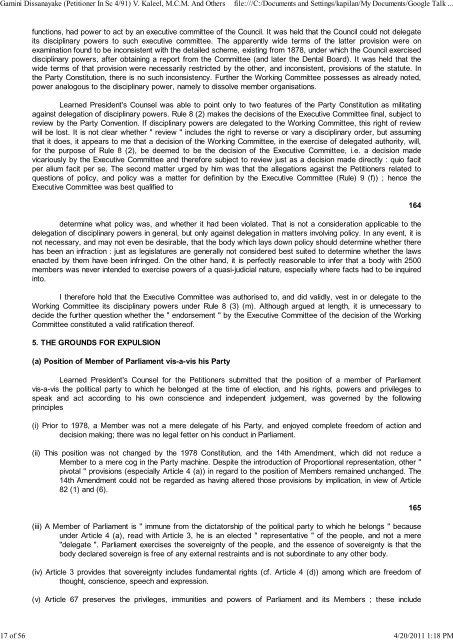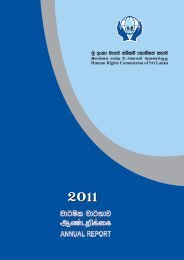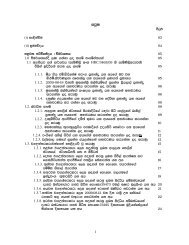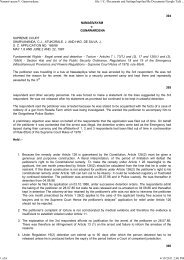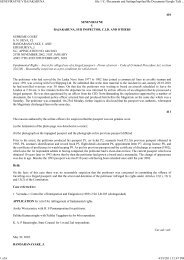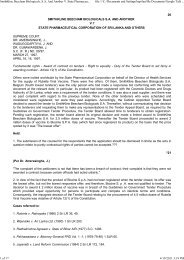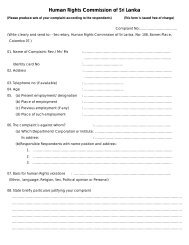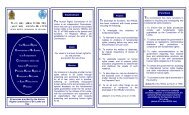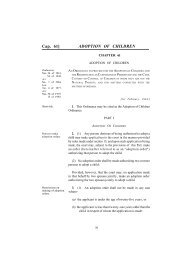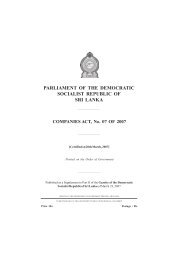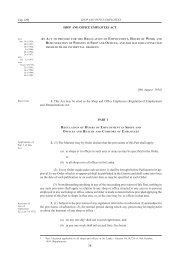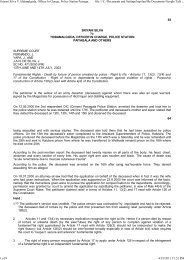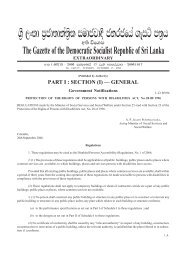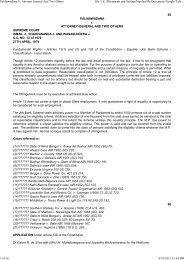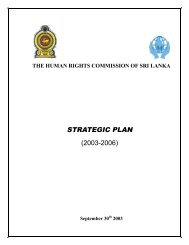Gamini Dissanayake (Petitio... - Human Rights Commission of Sri ...
Gamini Dissanayake (Petitio... - Human Rights Commission of Sri ...
Gamini Dissanayake (Petitio... - Human Rights Commission of Sri ...
Create successful ePaper yourself
Turn your PDF publications into a flip-book with our unique Google optimized e-Paper software.
<strong>Gamini</strong> <strong>Dissanayake</strong> (<strong>Petitio</strong>ner In Sc 4/91) V. Kaleel, M.C.M. And Others file:///C:/Documents and Settings/kapilan/My Documents/Google Talk ...<br />
functions, had power to act by an executive committee <strong>of</strong> the Council. It was held that the Council could not delegate<br />
its disciplinary powers to such executive committee. The apparently wide terms <strong>of</strong> the latter provision were on<br />
examination found to be inconsistent with the detailed scheme, existing from 1878, under which the Council exercised<br />
disciplinary powers, after obtaining a report from the Committee (and later the Dental Board). It was held that the<br />
wide terms <strong>of</strong> that provision were necessarily restricted by the other, and inconsistent, provisions <strong>of</strong> the statute. In<br />
the Party Constitution, there is no such inconsistency. Further the Working Committee possesses as already noted,<br />
power analogous to the disciplinary power, namely to dissolve member organisations.<br />
Learned President's Counsel was able to point only to two features <strong>of</strong> the Party Constitution as militating<br />
against delegation <strong>of</strong> disciplinary powers. Rule 8 (2) makes the decisions <strong>of</strong> the Executive Committee final, subject to<br />
review by the Party Convention. If disciplinary powers are delegated to the Working Committee, this right <strong>of</strong> review<br />
will be lost. It is not clear whether " review " includes the right to reverse or vary a disciplinary order, but assuming<br />
that it does, it appears to me that a decision <strong>of</strong> the Working Committee, in the exercise <strong>of</strong> delegated authority, will,<br />
for the purpose <strong>of</strong> Rule 8 (2), be deemed to be the decision <strong>of</strong> the Executive Committee, i.e. a decision made<br />
vicariously by the Executive Committee and therefore subject to review just as a decision made directly : quio facit<br />
per alium facit per se. The second matter urged by him was that the allegations against the <strong>Petitio</strong>ners related to<br />
questions <strong>of</strong> policy, and policy was a matter for definition by the Executive Committee (Rule) 9 (f)) ; hence the<br />
Executive Committee was best qualified to<br />
determine what policy was, and whether it had been violated. That is not a consideration applicable to the<br />
delegation <strong>of</strong> disciplinary powers in general, but only against delegation in matters involving policy. In any event, it is<br />
not necessary, and may not even be desirable, that the body which lays down policy should determine whether there<br />
has been an infraction : just as legislatures are generally not considered best suited to determine whether the laws<br />
enacted by them have been infringed. On the other hand, it is perfectly reasonable to infer that a body with 2500<br />
members was never intended to exercise powers <strong>of</strong> a quasi-judicial nature, especially where facts had to be inquired<br />
into.<br />
I therefore hold that the Executive Committee was authorised to, and did validly, vest in or delegate to the<br />
Working Committee its disciplinary powers under Rule 8 (3) (m). Although argued at length, it is unnecessary to<br />
decide the further question whether the " endorsement " by the Executive Committee <strong>of</strong> the decision <strong>of</strong> the Working<br />
Committee constituted a valid ratification there<strong>of</strong>.<br />
5. THE GROUNDS FOR EXPULSION<br />
(a) Position <strong>of</strong> Member <strong>of</strong> Parliament vis-a-vis his Party<br />
Learned President's Counsel for the <strong>Petitio</strong>ners submitted that the position <strong>of</strong> a member <strong>of</strong> Parliament<br />
vis-a-vis the political party to which he belonged at the time <strong>of</strong> election, and his rights, powers and privileges to<br />
speak and act according to his own conscience and independent judgement, was governed by the following<br />
principles<br />
(i) Prior to 1978, a Member was not a mere delegate <strong>of</strong> his Party, and enjoyed complete freedom <strong>of</strong> action and<br />
decision making; there was no legal fetter on his conduct in Parliament.<br />
(ii) This position was not changed by the 1978 Constitution, and the 14th Amendment, which did not reduce a<br />
Member to a mere cog in the Party machine. Despite the introduction <strong>of</strong> Proportional representation, other "<br />
pivotal " provisions (especially Article 4 (a)) in regard to the position <strong>of</strong> Members remained unchanged. The<br />
14th Amendment could not be regarded as having altered those provisions by implication, in view <strong>of</strong> Article<br />
82 (1) and (6).<br />
(iii) A Member <strong>of</strong> Parliament is " immune from the dictatorship <strong>of</strong> the political party to which he belongs " because<br />
under Article 4 (a), read with Article 3, he is an elected " representative " <strong>of</strong> the people, and not a mere<br />
"delegate ". Parliament exercises the sovereignty <strong>of</strong> the people, and the essence <strong>of</strong> sovereignty is that the<br />
body declared sovereign is free <strong>of</strong> any external restraints and is not subordinate to any other body.<br />
(iv) Article 3 provides that sovereignty includes fundamental rights (cf. Article 4 (d)) among which are freedom <strong>of</strong><br />
thought, conscience, speech and expression.<br />
(v) Article 67 preserves the privileges, immunities and powers <strong>of</strong> Parliament and its Members ; these include<br />
17 <strong>of</strong> 56 4/20/2011 1:18 PM<br />
164<br />
165


